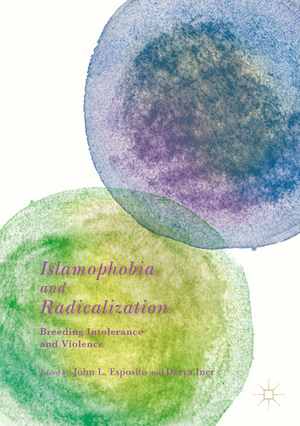Islamophobia and Radicalization: Breeding Intolerance and Violence
Editat de John L. Esposito, Derya Ineren Limba Engleză Paperback – 18 oct 2018
Preț: 184.72 lei
Nou
Puncte Express: 277
Preț estimativ în valută:
35.35€ • 36.98$ • 29.36£
35.35€ • 36.98$ • 29.36£
Carte disponibilă
Livrare economică 12-26 martie
Livrare express 26 februarie-04 martie pentru 39.54 lei
Preluare comenzi: 021 569.72.76
Specificații
ISBN-13: 9783319952369
ISBN-10: 3319952366
Pagini: 176
Ilustrații: XVII, 288 p. 4 illus.
Dimensiuni: 148 x 210 x 26 mm
Greutate: 0.37 kg
Ediția:1st ed. 2019
Editura: Springer International Publishing
Colecția Palgrave Macmillan
Locul publicării:Cham, Switzerland
ISBN-10: 3319952366
Pagini: 176
Ilustrații: XVII, 288 p. 4 illus.
Dimensiuni: 148 x 210 x 26 mm
Greutate: 0.37 kg
Ediția:1st ed. 2019
Editura: Springer International Publishing
Colecția Palgrave Macmillan
Locul publicării:Cham, Switzerland
Cuprins
Introduction: Theoretical Discussion and Empirical Findings.- Part I: Co-radicalization.- 1. Ironies of scapegoating: From Islamophobia to Radicalization (Michael Welch).- 2. Religious Extremism and Islamophobia: A Problem of Reactive Co-radicalization? (Douglas Pratt).- 3. How Islamophobes are Reproduced and Radicals Responded to the Halal Debate in Australia: Let’s Feed Radicals with the Halal (Derya Iner).- Part II: The Crosspollination of Radicalization and Islamophobia: Local and Global Factors.- 4. Can Islamophobia in the Media Serve the Islamic State Propaganda? The Australian Case, 2014-2015 (Nahid Kabir).- 5. Morocconization of Dutch Islamophobia and the Increase of Radicalism among the Moroccan Dutch (Sam Cherribi).- 6. Radicalization and Islamophobia as a Global Management Failure in Syria (Radwan Ziadeh).- Part III: Countering Terrorism with Islamophobia.- 7. How Counterterrorism Radicalizes: Exploring the Nexus between Counterterrorism and Radicalization (Haroro Ingramand Kriloi Ingram).- 8. Deepening Divides? Implementing Britain’s “Prevent” Counterterrorism Program (Paul Thomas).- 9. When the ‘Right Thing to Do’ Feels So Wrong: Australian-Muslim Perspectives on ‘Intimates’ Reporting to Authorities about Violent Extremism (Michelle Grossman).- Part IV: The Products of Radicalization and Islamophobia.- 10. Historically Reproduced Muslim as a “Subject” of Islamophobia and Radicalization (Katy Naban).- 11. Muslim: Islamophobic and radical discourse: A Driving Force for Muslim Active Citizenship (Mario Peucker).- 12. Activist Muslims and the Hizmet Movement: Can Islamophobia and Islamic Extremism be Addressed at the Same Time? (Ihsan Yilmaz and Ismail Sezgin).
Notă biografică
John L. Esposito is University Professor, Professor of Religion & International Affairs, Professor of Islamic Studies, Founding Director of the Alwaleed Center for Muslim-Christian Understanding at the Walsh School of Foreign Service, and Director of The Bridge Initiative at Georgetown University, USA.
Derya Iner is Senior Lecturer and Research Coordinator at the Centre for Islamic Studies, Charles Sturt University, Australia. Her research interests include contemporary issues related to Islam and Islamic cultures.
Derya Iner is Senior Lecturer and Research Coordinator at the Centre for Islamic Studies, Charles Sturt University, Australia. Her research interests include contemporary issues related to Islam and Islamic cultures.
Textul de pe ultima copertă
While the themes of radicalization and Islamophobia have been broadly addressed by academia, to date there has been little investigation of the crosspollination between the two. Is Islamophobia a significant catalyst or influence on radicalization and recruitment? How do radicalization and Islamophobia interact, operate, feed one another, and ultimately pull societies toward polar extremes in domestic and foreign policy? The wide-ranging and global contributions collected here explore these questions through perspectives grounded in sociology, political theory, psychology, and religion. The volume provides an urgently needed and timely examination of the root causes of both radicalization and Islamophobia; the cultural construction and consumption of radical and Islamophobic discourses; the local and global contexts that fertilize these extreme stances; and, finally, the everyday Muslim in the shadow of these opposing but equally vociferous forces.
Caracteristici
The first book-length exploration of the cooperative relationship between Islamophobia and radicalization Brings together perspectives in sociology, public policy and politics, psychology, criminology, and religious studies to explore the root causes of radicalization and the impact of Islamophobia Contributors from the USA, UK, Australia, and Europe examine case studies in these and other countries, ensuring a global reach even as they address local case studies
